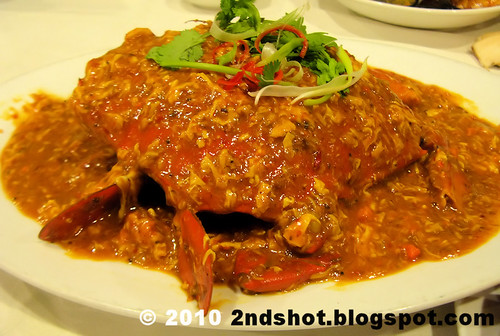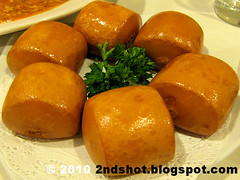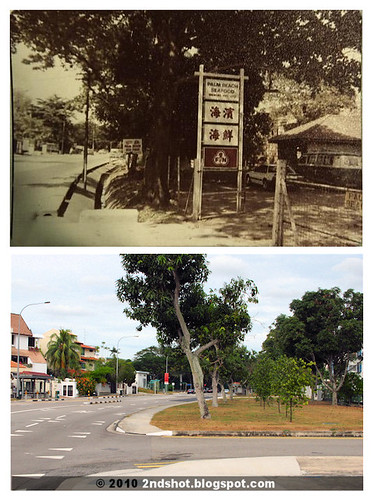I had a reunion dinner of sorts late last month. Call that premature but since Ah Tiong had to return home for Chinese New Year, it was then or never. It was a double occasion as Ah Tiong got his pay increment and to
That was my second visit to the restaurant. Both times I ordered their chilli crab and man tou and on both occasions they were good. I ordered more food and drinks the second time because
The crab and gravy left a deep impression on me. I had not have chilli crabs for a long time and chilli crab never tasted so good in my memory. The gravy was not overly spicy or sweet and the fried man tou to go with the gravy was excellent. Ah Tiong, being northerner (their staple is not rice unlike southern Chinese), ordered more man tou, thankfully. To let the gravy go to waste would be a sin. There was still excess gravy after the meal, meaning we did not order enough man tou. I decided the attack strategy next time would be 10 man tou per person at the minimum, with rice to back them up; only then would the whole chilli crab dish be defeated.
Man Tou to go with the chilli crab. Not sure what Ah Tiong calls this type of Man Tou and who invented the practice of dipping them in gravy. I started to love them ever since I had them for breakfast in China last year. Being Singaporeans, we probably make do with dipping Roti.
Other than the gravy, their preparation of the Sri Lankan crab was first-class. The shell was surprisingly soft and using just my teeth to exert a gentle crush the crab meat would be exposed. Let your teeth sink further in - oomph, shiok! I can still remember the struggle with crab in other restaurants - the shell was as hard as rock, maybe even harder, and my teeth felt like snapping off any time. Thus I would be sufficiently discouraged before resorting to the metallic tool provided. To suddenly grab cold metal stained with scattered specks of chilli crab gravy is an experience to be avoided; the tool is a beast in itself and let's just say I'm clumsy with its usage.
Soy Sauce Prawns, another of their famous dish. The prawn presentation was "so-so", remarked Ah Tiong, but once the prawn entered the mouth - slurrp, shiok! The recipe for Tau You Prawns is a trade secret, known only to the owner, his brother and their mum.
I only came to know about Roland Restaurant late last year. Some friends of mine were coming from Indonesia and chilli crab was on their itinerary, besides laksa, Singapore Flyer, Merlion etc. So where's the best place for chilli crabs? Coincidentally that was not long after Malaysian Tourism minister Ng Yen Yen made the infamous remark in September 2009 about chilli crabs as uniquely Malaysian. This prompted Leslie Tay to blog about Roland Restaurant and the history of chilli crabs, which I read.
In short Roland Restaurant is the original founder of the Singapore Chilli Crab. That was during its previous incarnation as Palm Beach Seafood, in 1956. I guess the "original" differentiates it from Palm Beach Seafood today, which the owners sold off in the 1980s when the family migrated to New Zealand. Being a "heritage person", how can I not pay pilgrimage to the birth place of chilli crabs? So I brought my Indonesian friends from town to Marine Parade (deliberately overlooking Palm Beach Seafood at One Fullerton, which is nearer to the Merlion, really super near lor) to try the original chilli crabs.
They - the Indonesian and Ah Tiong - commended the crab was great. One even entertained the idea of dabao-ing the chilli crab home for her dad next time. From her, I learnt that No Signboard Seafood has a branch in Jakarta but their chilli crab is expensive and not as good. In Roland, Sri Lankan crab is $4.20/100 grams.
Mission accomplished. Foreigners tried our Singapore Institution and I paid pilgrimage to the original chilli crabs. What about the original Palm Beach Seafood Restaurant? Forget about One Fullerton and East Coast Seafood Centre. The original home of Palm Beach, like many seafood restaurants in 60s and 70s, was at Upper East Coast Road.
Image credit: streetdirectory.com
Old photo of Palm Beach retrieved via ieatishootipost. With the help of Peter, I managed to track down the old location of Palm Beach at #514 Upper East Coast Road. I was told to focus on the road bend. Squint your eyes, you can see what looks like a car sloping down in the old photo and a grass slope in the present photo. That would be the Parbury side of Upper East Coast Road, near the 13km SingPower substation today.
I have always wondered how did Palm Beach get its name. The conventional wisdom is that since the restaurant was at the seafront which was dotted with coconut palms, that must be how the restaurant got its name. Really?
Old photo of Palm Beach retrieved via ieatishootipost. Like the old photo showing the road bend, this does not look like a seafront restaurant. Can you see any coconut palm? Background looks like a forest though.
Not far away from Palm Beach was Wyman Haven, the seafood restaurant owned by Peter's maternal grandmother - There was one other competitor to Wyman Haven on the same road about 4 houses away at that time – it was the Palm Beach Seafood (source). Peter recalled seeing " tall palm trees just before coming to Wyman Haven from the city direction". According to him, the same trees are still standing today, in front of The Daffodil.
Did these trees in front of The Daffodil give Palm Beach her name? They look kinda artificial standing upright and so nicely in a row. Shouldn't authentic palm trees be slightly bent at the trunk, having battled the sea breeze for decades? Photo taken in 2010, but effects were added just to make it look "old".
Today terrace houses stand on the site of the old Palm Beach. From the main road, you see a forested area behind, which will end beside the ECP. Curious what lies actually behind the terrace houses (maybe an abandoned crab tank?), I ventured behind and found not one but two palm trees.
Palm trees at old Palm Beach location. What I meant by authentic palm tree - trunk slightly bent for the shorter tree. But can a short palm tree be authentic?
Palm Beach certainly did not enjoy her beach-front status for long. According to the chilli crab story, Palm Beach Restaurant at #514 Upper East Coast Road where most people ate their chilli crabs was opened only in 1963. The first land reclamation began around the area in 1961. The scene in front of Palm Beach would be like what Peter described for Wyman Haven, "the sea in front of my maternal grandmother’s bungalow house became murkier each time I came until soon I found the sea breeze had weakened considerably." By 1970, the area in front of Palm Beach was one big reclaimed land with no trees. The old photos of Palm Beach, therefore, should be from the 1970s. When the old Palm Beach was in its heydays, supposedly the 70s and 80s, there was no authentic beach-front feeling any more.
I suppose the authentic beach-front setting would be during the pre-Malaysian days before 1963 when the business was still a pushcart. According to Leslie Tay when recounting the history of Palm Beach:
By 1956, they had progressed from a pushcart to a little shack that was lit by hurricane lamps. Because of the Coconut Palms along the Beach, Mr Lim called his little "shackestaurant" Palm Beach Seafood.An authentic beach-front dotted with swaying coconut palms, the sea breeze gently caressing your face as you slurp the crab meat from its shell, certainly makes for a lethal combination. Man tou ready at the side, do not waste the gravy please.








Palm tree trunks do not bend into a permanent shape like coconut trees. Palm trees only sway with the wind.
ReplyDeleteThis is based on my experience looking after palm trees from a young age.
Actually I'm confused over the terms - coconut tree, palm tree, coconut palm. What other combinations?
ReplyDeleteI think I can only tell the oil palms in the Malaysian plantations apart from the rest.
If the current Palm Beach Seafood website is to be believed, palm here refers to coconut trees - look at this screenshot.
ReplyDeleteThat photo of Palm Beach Seafood is now Temasek Secondary School's basketball site. Those are coconut trees not palm trees.
ReplyDeleteCocount Palm - first time I hear. So maybe second generation from crossing coconut and palm tree?
Palm tree as far as I know is not native to Singapore. Coconut trees grew wildly along Singapore beaches and kampungs (especially sandy areas) whereas palm trees are planted in towkay's mansion. Coconut tree resistant to seawater whereas palm tree cannot tahan too much water (let alone seawater) otherwise rot. There are many kinds of palm trees, e.g. travellers palm like @Raffles Hotel, Red Palm (common in gardens today) and Indian Palm.
Coconut trees got many types; the one in the photo has skinny trunk but there are short type coconut trees (need a ladder to climb to reach the fruits) with yellow leaves (and beairng coconut fruits as well). Go to Bedok Canal, you find foc coconut fruit. Pluck and lie down and drink like tody. I see many Indian workers drink and get tipsy.
peter, the coconut is a member of the palm tree family. so, it can be called a coconut tree or a coconut palm.
ReplyDeletei think this article is about icemoon's second shot at roland's chilli crab.
From man holes to man tous, when will you be focussing your attention on the fairer sex, Icemoon?
ReplyDeleteThe fairer sex will only be mentioned in passing, no topic about them Victor.
ReplyDeleteThis article is about my search for the old location of Palm Beach Seafood, and the palms that gave the restaurant its name.
If what I imagined is true, most people in the late 60s, 70s and 80s could not see the sea from the seafood restaurants along Upper East Coast. Isn't this ironic? But they can see it from East Coast Seafood Center.